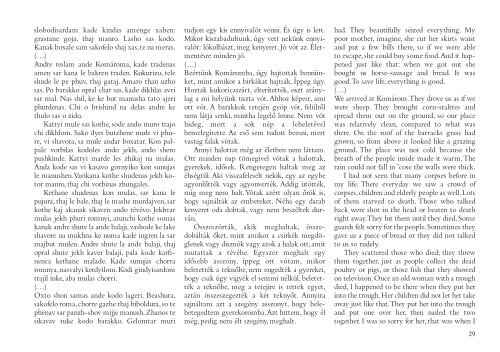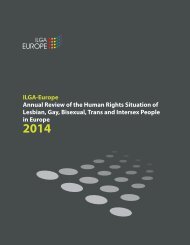Create successful ePaper yourself
Turn your PDF publications into a flip-book with our unique Google optimized e-Paper software.
slobodisardam kade kindas amenge xaben:<br />
grastane goja, thaj manro. Lasho sas kodo.<br />
Kanak boxale sam sakofelo shaj xas, te na meras.<br />
(…)<br />
Andre reslam ande Komároma, kade tradenas<br />
amen sar kana le bakren traden. Kukurizo, tele<br />
shude le pe phuv, thaj gataj. Amaro than uzho<br />
sas. Po barakko opral char sas, kade dikhlas avri<br />
sar mal. Nas shil, ke ke but ma nusha tato ajeri<br />
phurdenas. Chi o brishind na delas andre ke<br />
thulo sas o zido.<br />
Kattyi mule sas kothe, sode ando muro trajo<br />
chi dikhlom. Sako dyes butzhene mule vi phu -<br />
re, vi shavora, sa mule andar boxatar. Kon palpale<br />
vorbilas ko do les ando jekh, ando shero<br />
pushkinde. Kattyi marde les zhikaj na mulas.<br />
Anda kode sas vi kasavo gornyiko kon sunujas<br />
le manushen. Varikana kothe shudenas jekh ko -<br />
tor manro, thaj chi vorbinas zhungales.<br />
Kethane shudenas kon mulas, sar kana le<br />
pujura, thaj le bale, thaj le mashe murdajven, sar<br />
kothe kaj akanak sikaven ando tévévo. Jekh var<br />
mulas jekh phuri romnyi, atunchi kothe somas<br />
kanak andre shute la ande balaji, vashode ke lake<br />
shavore na mukhna ke numa kade ingren la sar<br />
majbut mulen. Andre shute la ande balaji, thaj<br />
opral shute jekh kaver balaji, pala kode karfinenca<br />
kethane malade. Kade sunujas chorra<br />
romnya, nasvalyi kerdyilom. Ko di gin dyisardom<br />
trajil inke, aba mulas chorri.<br />
(…)<br />
Oxto shon samas ande kodo lageri. Beashura,<br />
sakofelo roma, chorre gazhe thaj biboldura, so te<br />
phenav sar panzh-shov mijje manush. Zhanos te<br />
sikavav tuke kodo barakko. Gelomtar muri<br />
tudjon egy kis ennyivalót venni. És úgy is lett.<br />
Mikor kiszabadultunk, úgy vett nekünk ennyivalót:<br />
lókolbászt, meg kenyeret. Jó vót az. Életmentésre<br />
minden jó.<br />
(…)<br />
Beértünk Komáromba, úgy hajtottak bennünket,<br />
mint amikor a birkákat hajtsák. Íppeg úgy.<br />
Hoztak kukoricaszárt, elterítették, oszt aránylag<br />
a mi helyünk tiszta vót. Ahhoz képest, ami<br />
ott vót. A barakkok tetején gyöp vót, felülrôl<br />
nem látja senki, mintha legelô lenne. Nem vót<br />
hi deg, mert a sok nép a leheletével<br />
bemelegítette. Az esô sem tudott beesni, mert<br />
vastag falak vótak.<br />
Annyi halottat még az életben nem láttam.<br />
Ott minden nap tömegivel vótak a halottak,<br />
gye rekek, idôsek. Rengetegen haltak meg az<br />
éhségtül. Aki visszafeleselt nekik, egy az egybe<br />
agyonlûtték vagy agyonverték. Addig ütötték,<br />
míg meg nem halt. Vótak azért olyan ôrök is,<br />
hogy sajnálták az embereket. Néha egy darab<br />
ke nyeret oda dobtak, vagy nem beszéltek dur -<br />
ván.<br />
Összeszórták, akik meghaltak, összedobálták<br />
ôket, mint amikor a csirkék megdöglenek<br />
vagy disz nók vagy azok a halak ott, amit<br />
mutattak a tévébe. Egyszer meghalt egy<br />
idôsebb asszony, íp peg ott vótam, mikor<br />
beletették a teknôbe, nem engedték a gyerekei,<br />
hogy csak úgy vi gyék el semmi nélkül, beletették<br />
a teknôbe, meg a tetejire is tettek egyet,<br />
aztán össze sze gezték a két teknyôt. Annyira<br />
sajnáltam azt a szegény asszonyt, hogy belebetegedtem<br />
gye rek oromba. Azt hittem, hogy él<br />
még, pedig nem élt szegény, meghalt.<br />
had. They beautifully seized everything. My<br />
poor mother, imagine, she cut her skirts waist<br />
and put a few bills there, so if we were able<br />
to escape, she could buy some food. And it happened<br />
just like that: when we got out she<br />
bought us horse-sausage and bread. It was<br />
good. To save life, everything is good.<br />
(…)<br />
We arrived at Komárom. They drove us as if we<br />
were sheep. They brought corn-stalttes and<br />
spread them out on the ground, so our place<br />
was relatively clean, compared to what was<br />
there. On the roof of the barracks grass had<br />
grown, so from above it looked like a grazing<br />
ground. The place was not cold because the<br />
breath of the people inside made it warm. The<br />
rain could not fall in ’cose the walls were thick.<br />
I had not seen that many corpses before in<br />
my life. There everyday we saw a crowd of<br />
corpses, children and elderly people as well. Lots<br />
of them starved to death. Those who talked<br />
back were shot in the head or beaten to death<br />
right away. They hit them until they died. Some<br />
guards felt sorry for the people. Sometimes they<br />
gave us a piece of bread or they did not talked<br />
to us so rudely.<br />
They scattered those who died; they threw<br />
them together, just as people collect the dead<br />
poultry or pigs, or those fish that they showed<br />
on television. Once an old woman with a trough<br />
died, I happened to be there when they put her<br />
into the trough. Her children did not let her take<br />
away just like that. They put her into the trough<br />
and put one over her, then nailed the two<br />
together. I was so sorry for her, that was when I<br />
29



